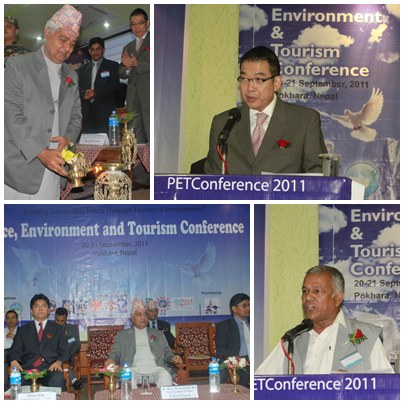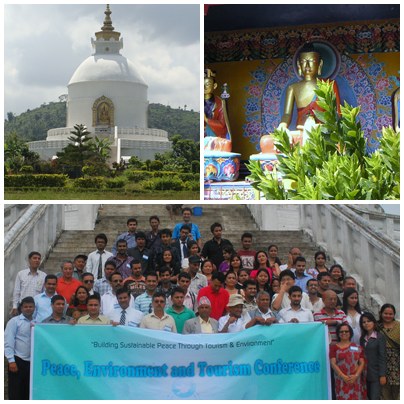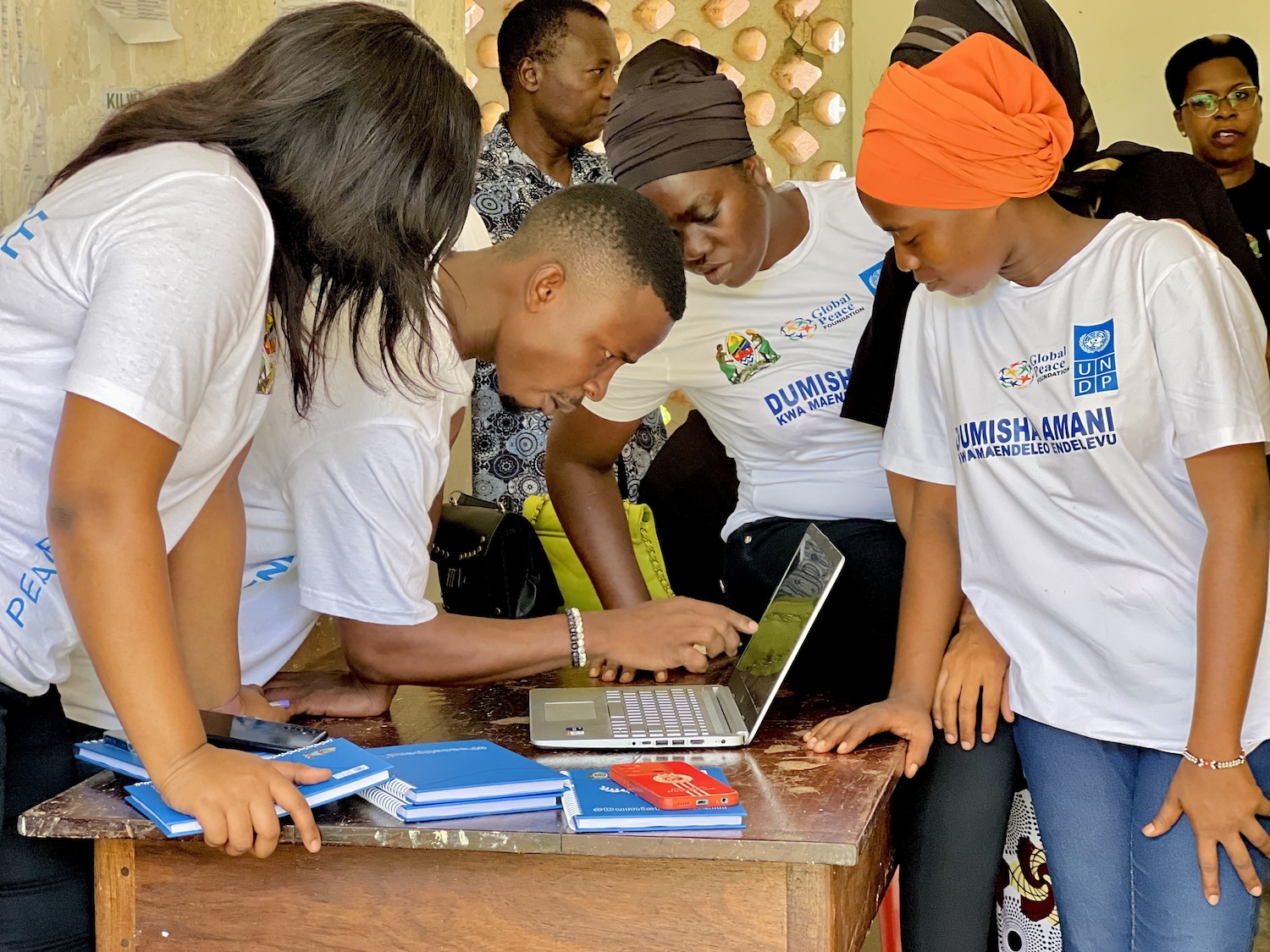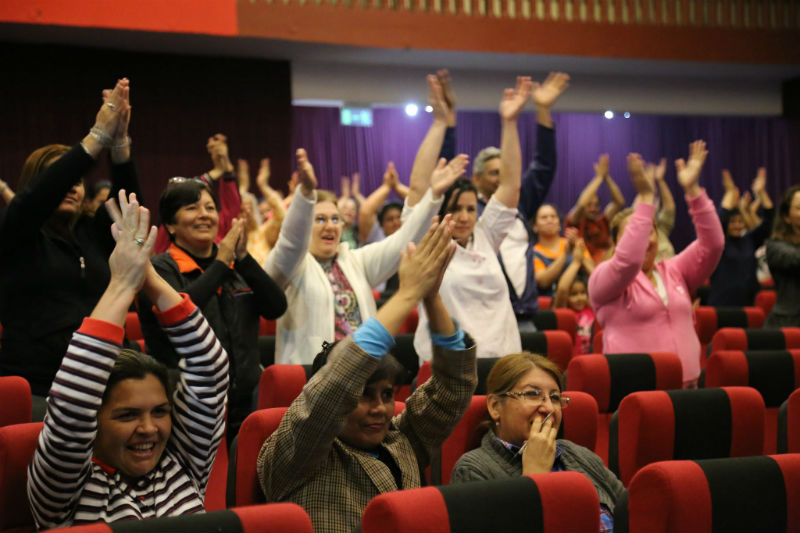More than 300 national and international delegates advanced new proposals for peace-building, environmental management and tourism at a two-day conference in Pokhara, Nepal, one of the Himalayan nation’s premiere tourist destinations. The Peace, Environment, and Tourism (PET) Conference, held on September 20-21, 2011, examined tourism not only as an engine for economic development, but also for its capacity to foster peace through cross-cultural exchanges among people and friendly exposure to the colorful traditions of different societies.

Rt. Honorable Parmanand Jha, Vice President of Nepal (top left), His Excellency Mr. Maris Sangiampongsa, Ambassador of Royal Thai Embassy to Nepal (top right), and Mr. Ganesh Shah, Chairman of PET Conference 2011, address delegates.
The PET conference was organized by the Global Peace Association (GPA) and Himalayan Alliance for Climate Change (HIMCCA) with the support of Nepal’s Ministry of Peace and Reconstruction, Ministry of Environment, Ministry of Tourism and Civil Aviation, Federation of Nepalese Chambers of Commerce and Industry, Worldwide Fund for Nature, Local Initiative for Biodiversity Research and Development, Central Department of Environmental Science of Tribhuvan University, Nepal Tourism Year 2011 and Nepal Tourism Board.
Rt. Honorable Parmanand Jha, Vice President of Nepal and the chief guest of the event, led the ceremonial opening of the conference by a lighting of the panas (lamp). “I believe that Nepal will be a source of inspiration for the entire world if the ongoing peace process will reach its destination,” the Vice President told the conference. He said that he believes that this type of international conference will be a model for the integration of peace-building, economic development through tourism, and responsible stewardship of the environment. The vice President congratulated the organizers of the event for its success and said that change is not possible through the efforts of a single person, and that the people of Nepal must work together to effect real change.
The PET Conference, which included researchers, policy makers, government ministers, international development agencies, civil society organizations and entrepreneurs, sought to develop comprehensive, multi-sector approaches that can be advanced through political legislation as well as through neighborhood and civil society initiatives.
During the inaugural ceremony of the two day program, PET Conference organizer Mr. Bindu Raj Adhikari welcomed the delegates. He was followed by Dr. Kishor Rajbhandari, President of GPA Nepal, who introduced GPF’s mission and activities in Nepal, which emphasize peace-building, political reform and transparency, and development, particularly in remote areas. For example, GPA Nepal recently opened a number of Peace Libraries in rural regions to support literacy and education and advance principles of peaceful coexistence.

THE POKARA DECLARATION
We the participants and delegates from India, Bangladesh, Turkey, Korea, Thailand, Philippines, USA, Germany and Nepal unanimously agree to continue the theme of Peace, Environment and Tourism Conference held on 20-21 September, 2011 in Pokhara, Nepal in upcoming years at a convenient time and place.
We agree to carry out the issues presented at the Peace, Environment & Tourist Conference 2011 at individual, institutional and national levels to advance policy, programs and action plans for the protection of common natural and cultural heritages.
We agree to carry out model pilot projects related to ecotourism, agro-tourism, religious tourism, educational tourism, health tourism and other tourism initiatives for the common benefit of the people.
We agree to advocate for the institutionalization of Peace, Environment & Tourism in formal and informal education from community level to higher education in the areas untouched so far in our respective countries.
We agree to ensure the safety and security of individuals from any kind of violence against any domestic or international tourists from their origin to destination.
A local representative, Mr. Tika Ram Sapkota, the President of Pokhara Tourism Council, expressed hope that the PET Conference will contribute to the development of Nepal’s tourism industry. GPF Asia Region Executive Director Mr. Jinsoo Kim discussed the advantages of the technology in modern life, especially in connecting with each other around the globe. He noted the three pillars of Global Peace Foundation: developing a culture of service, fostering interfaith understanding and cooperation, and strengthening the family as the building block of a peaceful society. “What is most important now is not how and where human family began millions of years ago, but rather how, where and when human family will at last come together to live in peace” he said.
A special guest, His Excellency Mr. Maris Sangiampongsa, Ambassador of Royal Thai Embassy to Nepal, gave an inspiring speech, stressing that the private sector plays an important role in achieving sustainable development. He said that despite his country’s recent political challenges, Thailand was still moving forward because of the teamwork of government officials and the private sector.
Mr. Ganesh Shah, Chairman of PET Conference 2011 and former Minister of Environment, Science and Technology, thanked delegates for their commitment to peaceful change in Nepal, adding that to establish sustainable peace the information and practices presented at the conference needed to be circulated and implemented by local people. He said that most of the participants were young people and if they maintain the interest and enthusiasm evident at the conference, Nepal will be better and more beautiful in ten years time.
After the inaugural program, the plenary sessions, and working sessions, and interactive forums advanced the conference objectives in the areas of peace, tourism and the environment. On the last day of the conference, delegates visited the World Peace Stupa, located at the top of the hill with a majestic view of the Fewa Lake in Pokhara. Attending delegates formed a circle and offered a short prayer for world peace in celebration of the International Day of Peace.
Following remarks by Dr. Dibya Ratna Kansakar, visiting faculty of Nepal Engineering College, at the closing ceremony, Mr. Sudeep Thakuri, an environmental researcher, presented the six-point declaration of the PET Conference 2011.(See the Pokara Declaration)

The World Peace of Shanti Supa in Pokara. Delegates gathered at the supa to dedicate their efforts to peace.
Following the presentation and adoption of the Declaration, Dr. Naci Polat , Asst. Professor and Chairman of Tourism and Travel Department at Dumlupinar University, Turkey; Indian scholar Dr. Ved Pal Singh Deswal, and Mr. Ganesh Bhattarai, Former President, Pokhara Tourism Council, presented brief messages, asking politicians and citizens to work together to preserve the culture and natural resources of Nepal, to develop not only the tourist sector but the education sector and other sectors as well.
Chief of Guest Prof. Khagendra Prasad Bhattarai, Vice Chancellor, Pokhara University, remarked that we have to protect the environment and maintain a balance between modern development and environmental protection. Retired Gen. Rookmangud Katawal, the Special Guest of the closing ceremony, concluded by saying, “I’ve seen a little problem with us human beings. The problems arising today are questions of management, man and material management. Men don’t know how to manage; that’s why we pose problems to the growth and livelihood of mankind.”
Calling specifically on youth, he told them to manage themselves at home, in school and in the community to be role models and the symbols of purity and integrity of this nation.



